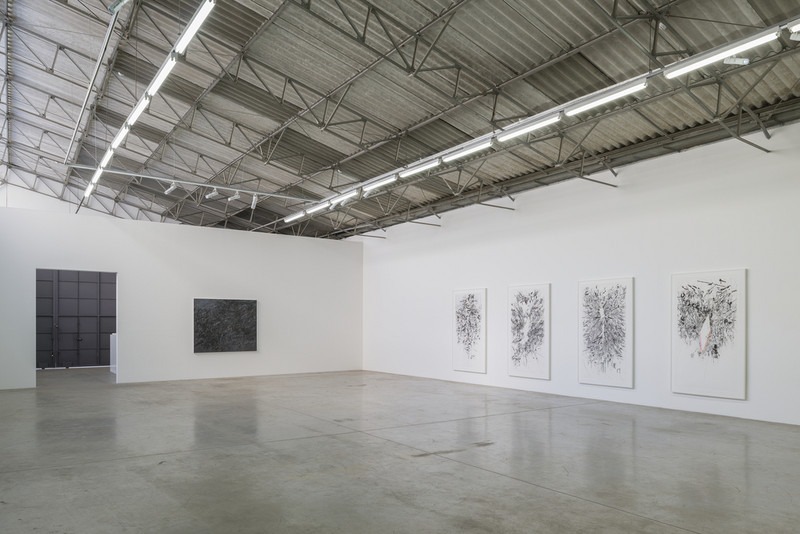Julie Mehretu
01 Sep - 01 Nov 2014
JULIE MEHRETU
The Mathematics of Droves
1 September – 1 November 2014
Marking her third solo presentation at White Cube, this is Mehretu’s first major solo show in Brazil, further to her inclusion in the XVI Bienal de São Paulo in 2004.
This body of work evolved from the Mogamma series of 2012, which was informed by the Arab Spring revolution of the same year. Whilst those works utilised distinct architectural motifs as a metaphor for the unfolding socio-economic and political scenario, these recent paintings appear as a direct response to the aftermath of this event and are seemingly more contemplative and pared down.
Adhering to Lost Lines (2014), one of the first paintings that Mehretu made for this new series, employs the artist’s familiar visual style with the ground overlain with images from Parisian city maps and monumental arches that can be found in the chapels, gates and mausoleums that populate the city of Damascus. In turn, the foreground is built up of looser brushstrokes and rhythmic markings, pooled from the lexicon of visual motifs and marks developed by Mehretu within her practice. Born of a geometric framework, the painting is noticeably devoid of colour and, like the remainder of the series, develops across a monochrome canvas.
Using more typical architectural tropes mainly drawn from the city of Aleppo before its destruction in the recent Syrian conflict, Aleppo (2014) contains an impossible universe, created from layering numerous cartographic elements. Certain aspects become indecipherable and congested; a frenetic cross-hatching of lines and graphite on a light grey ground wrestles with areas of the painting where there is erasure, blurring and vacancy. The painting persists – part relic, part mirage – in existing in an in-between place that is simultaneously hopeful and questioning. The specificity of place becomes less relevant. The wiping out of certain histories being an opportunity for something new to emerge and take root. Mehretu describes this as ‘the intention of everything just distilling – allowing everything to break up into pieces of dust, vapor, or more atmosphere’.
The literal ‘sharpness’ inherent in Mehretu’s earlier works is softened in this series; inks and acrylics become washes and smudges and daubs are left to navigate to the canvas edge. Whereas the centre held its own most forcibly in Mehretu’s earlier works, now it seems to be disintegrating. ‘After years of building her visual language, of loading up the paintings with information, almost to the point of implosion, Mehretu has identified the act of erasure as central to more recent work.' 2 In spite of, or maybe because of this, the paintings still maintain their rigour, becoming almost more provocative due to their apparent rootlessness; with their quietude allowing for the consideration of newer possibilities.
1. Julie Mehretu speaking to Susan Sollins: ‘Julie Mehretu: To Be Felt as Much as Read’, May 2013. © Art21, Inc.
2. Nickas, Bob. ‘Painting Abstraction: New Elements in Abstract Painting’, Phaidon, October 2009, p.258
The Mathematics of Droves
1 September – 1 November 2014
Marking her third solo presentation at White Cube, this is Mehretu’s first major solo show in Brazil, further to her inclusion in the XVI Bienal de São Paulo in 2004.
This body of work evolved from the Mogamma series of 2012, which was informed by the Arab Spring revolution of the same year. Whilst those works utilised distinct architectural motifs as a metaphor for the unfolding socio-economic and political scenario, these recent paintings appear as a direct response to the aftermath of this event and are seemingly more contemplative and pared down.
Adhering to Lost Lines (2014), one of the first paintings that Mehretu made for this new series, employs the artist’s familiar visual style with the ground overlain with images from Parisian city maps and monumental arches that can be found in the chapels, gates and mausoleums that populate the city of Damascus. In turn, the foreground is built up of looser brushstrokes and rhythmic markings, pooled from the lexicon of visual motifs and marks developed by Mehretu within her practice. Born of a geometric framework, the painting is noticeably devoid of colour and, like the remainder of the series, develops across a monochrome canvas.
Using more typical architectural tropes mainly drawn from the city of Aleppo before its destruction in the recent Syrian conflict, Aleppo (2014) contains an impossible universe, created from layering numerous cartographic elements. Certain aspects become indecipherable and congested; a frenetic cross-hatching of lines and graphite on a light grey ground wrestles with areas of the painting where there is erasure, blurring and vacancy. The painting persists – part relic, part mirage – in existing in an in-between place that is simultaneously hopeful and questioning. The specificity of place becomes less relevant. The wiping out of certain histories being an opportunity for something new to emerge and take root. Mehretu describes this as ‘the intention of everything just distilling – allowing everything to break up into pieces of dust, vapor, or more atmosphere’.
The literal ‘sharpness’ inherent in Mehretu’s earlier works is softened in this series; inks and acrylics become washes and smudges and daubs are left to navigate to the canvas edge. Whereas the centre held its own most forcibly in Mehretu’s earlier works, now it seems to be disintegrating. ‘After years of building her visual language, of loading up the paintings with information, almost to the point of implosion, Mehretu has identified the act of erasure as central to more recent work.' 2 In spite of, or maybe because of this, the paintings still maintain their rigour, becoming almost more provocative due to their apparent rootlessness; with their quietude allowing for the consideration of newer possibilities.
1. Julie Mehretu speaking to Susan Sollins: ‘Julie Mehretu: To Be Felt as Much as Read’, May 2013. © Art21, Inc.
2. Nickas, Bob. ‘Painting Abstraction: New Elements in Abstract Painting’, Phaidon, October 2009, p.258

